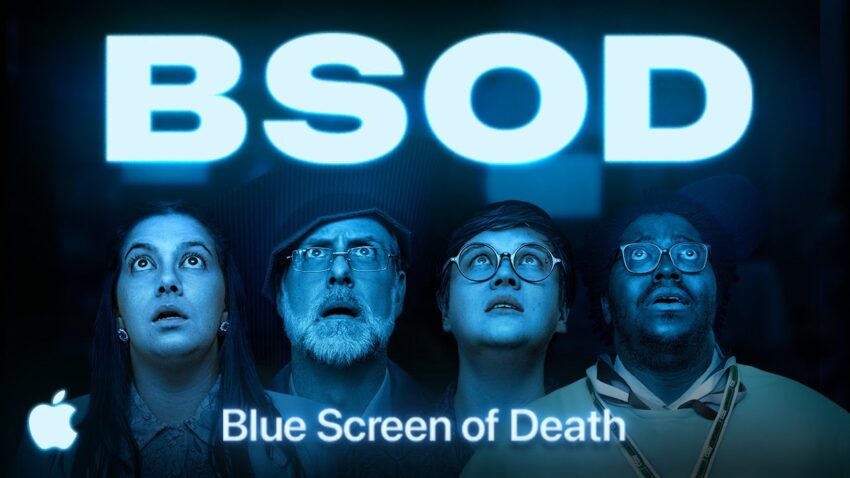
apple turned the crowdstrike bsod issue into Apple has recently released a provocative advertisement that takes a direct jab at Windows security, specifically targeting the CrowdStrike Blue Screen of Death (BSOD) incident that affected millions of Windows machines last year.
apple turned the crowdstrike bsod issue into
Overview of the Advertisement
The new eight-minute commercial from Apple follows a fictional company called The Underdogs as they prepare for an important trade show. However, chaos ensues when a PC outage occurs, leading to a Blue Screen of Death that disrupts operations at the convention. This scenario serves as a backdrop for Apple to highlight the vulnerabilities associated with Windows systems, particularly in the context of the CrowdStrike incident.
The CrowdStrike Incident
To understand the significance of Apple’s ad, it is essential to delve into the details of the CrowdStrike BSOD issue. Last year, a problematic update to CrowdStrike’s Falcon protection software, which operates at the kernel level, caused widespread BSOD issues. This incident had far-reaching implications, affecting various sectors, including banking, airlines, and television broadcasting. The BSOD is a critical error screen displayed by Windows operating systems upon encountering a fatal system error, effectively halting all operations and requiring a reboot.
As a result of the faulty update, numerous organizations experienced significant downtime, leading to financial losses and operational disruptions. The incident raised questions about the reliability of third-party security solutions and their impact on system stability. Apple’s ad cleverly capitalizes on this vulnerability, using humor and dramatization to underscore its point.
Key Themes in the Advertisement
Apple’s advertisement is not merely a critique of Windows; it also serves to promote its own products as a more secure alternative. The ad features an IT expert character named Sam, who discusses the intricacies of kernel-level functionality. Sam explains, “The endpoint security API handles kernel-level functionality by default; it doesn’t grant kernel-level access.” This statement highlights the security measures that Apple has implemented in its macOS, suggesting that Macs are inherently more secure than their Windows counterparts.
Technical Insights
The discussion around kernel-level functionality is crucial for understanding the technical aspects of operating system security. The kernel is the core component of an operating system, responsible for managing system resources and facilitating communication between hardware and software. By emphasizing that the deepest parts of an operating system are protected from modification by third-party software or malware, Apple aims to instill confidence in potential customers regarding the security of its devices.
Sam’s assertion that “it’s a PC problem” serves as a clear distinction between the vulnerabilities associated with Windows systems and the perceived security of Macs. This messaging aligns with Apple’s long-standing marketing strategy, which has often positioned Macs as the safer choice for consumers and businesses alike.
Historical Context of Apple’s Marketing Strategy
Apple’s approach to mocking Windows is not new. The company has a rich history of using humor and satire in its advertising campaigns to highlight the shortcomings of its competitors. The original “Get a Mac” campaign, which launched nearly 20 years ago, featured actor Justin Long as the “I’m a Mac” guy, who was often juxtaposed against the “I’m a PC” character, played by John Hodgman. This campaign included memorable moments, such as the “I’m a PC” character sneezing after catching a virus, effectively portraying Windows as a less secure option.
In recent years, Apple has continued to leverage this narrative. Justin Long made a return in a campaign that saw him defecting to Intel, where he praised PCs, only to later appear in a Qualcomm skit criticizing macOS notifications and nag screens. This evolution of Apple’s marketing strategy reflects a consistent effort to position its products as superior in terms of security and user experience.
Implications for Consumers and Businesses
The implications of Apple’s advertisement extend beyond mere marketing. For consumers, the ad serves as a reminder of the importance of security in their choice of operating systems. As cyber threats continue to evolve, the reliability of security solutions becomes paramount. Apple’s portrayal of Windows vulnerabilities may resonate with businesses that prioritize data protection and operational continuity.
For organizations that experienced disruptions due to the CrowdStrike BSOD incident, Apple’s ad may evoke memories of the challenges they faced. The ad could influence decision-makers to reconsider their reliance on Windows systems and explore alternatives, particularly if they are seeking to enhance their cybersecurity posture.
Stakeholder Reactions
The release of this advertisement is likely to elicit a range of reactions from various stakeholders. Windows users and IT professionals may view Apple’s mockery as a cheap shot, while Apple enthusiasts may appreciate the humor and the underlying message of security. Industry analysts may also weigh in, examining the potential impact of such advertising on market dynamics.
Moreover, the ad could spark discussions within the cybersecurity community regarding the reliability of third-party security solutions. As organizations increasingly rely on software to protect their systems, the importance of robust and reliable security measures cannot be overstated. Apple’s ad serves as a catalyst for these discussions, prompting stakeholders to evaluate their current security strategies.
Conclusion
Apple’s latest advertisement, which takes aim at the CrowdStrike BSOD incident, is a strategic move that reinforces its long-standing narrative of superior security. By dramatizing the vulnerabilities associated with Windows systems, Apple not only promotes its products but also raises awareness about the critical importance of cybersecurity in today’s digital landscape. As consumers and businesses navigate an increasingly complex threat environment, the choice of operating system may play a pivotal role in determining their overall security posture.
In a world where cyber threats are ever-present, Apple’s ad serves as a reminder that the choice of technology can have significant implications for security and operational continuity. Whether this advertisement will sway consumers and businesses to switch to Macs remains to be seen, but it undoubtedly adds to the ongoing conversation about the importance of security in technology.
Source: Original report
Was this helpful?
Last Modified: October 7, 2025 at 6:43 pm
6 views














